
Columnist Sangitha Aiyer argues that anonymous apps like Sidechat combat mass mental health stigma at Penn.
Credit: Insia Haque“[U]pvote if you’re not doing well at the moment, i’m (sic) trying to see something," an anonymous Penn student posted on Sidechat. 563 other Penn students upvoted it.
It’s no surprise that Penn students are unhappy and incredibly good at hiding it. This is Penn Face, a phenomenon that occurs when students put up a facade to make their lives appear perfect. In reality, many are struggling and unable to admit it.
The prevalence of Penn Face is a component of the University’s larger mental health problem. With insufficient support from Wellness at Penn and a horrific pattern of suicides, Penn Face adds salt to a festering wound. Under the constant pressure to present an appearance of perfection, it is unsurprising to see students’ mental health deteriorate during their time here.
The University recognizes the presence of Penn Face on campus. It has been selected as the topic of discussion in two College Dean’s Advisory Board panels, a Wharton fireside chat, and an Undergraduate Assembly website. Among students as well, Penn Face has been repeatedly identified as a part of our campus culture; we have been urged to acknowledge it, take it off, and rename it.
Despite the constant encouragement to purge Penn Face from University administration and students, very little has changed. Luckily, there is a different, less conventional solution.
Sidechat is an anonymous application that was designed for college students to communicate with one another through nameless, faceless accounts. It became available to Penn students in early 2022 and, since then, has become a popular yet controversial platform. When it comes to combating Penn Face, the anonymity that Sidchat provides has served as a positive force on campus.
Penn Face is characterized by the fear that one will be viewed as less accomplished, adequate, or worthy for admitting their struggles. However, when we take away the identities associated with experiencing challenges or mental health setbacks, Penn Face collapses.
The idea of anonymous apps combating mass mental health stigma is not confined to Penn’s campus. Platforms like Tethr, an anonymous app catered to men’s mental health, have been shown to provide a safety net for those who have trouble expressing themselves publicly. Unlike in-person mental health support groups, Tethr allows users to both give and receive emotional support without risking self disclosure. John Naslund, instructor of Global Health and Social Medicine at Harvard University, says that these networks “connect individuals with others facing similar challenges and offer commiseration within a safe, nonjudgmental virtual environment."
Similar to men’s mental health, Penn Face is composed of the same unspoken stigma surrounding experiencing and expressing emotional setbacks. And like Tethr, Sidechat is a platform that removes identity altogether to form a space where conversations can be had openly.
At its very core, Sidechat demonstrates to students that, despite how unbothered their peers might seem in person, there are people sitting behind a phone screen who are experiencing the same negative emotions. Whether you’re passively scrolling through the app or actively engaging with other anonymous users, it is not difficult to find voices of people who will candidly discuss their struggles.
Admittedly, Sidechat has received its fair share of criticism, due to the anonymity it provides users. This anonymity leads to the online disinhibition effect, which occurs when individuals feel less restricted when communicating in cyberspaces, in comparison to real-life situations. Platforms like Sidechat have the potential to breed an environment where users can be unabashedly cruel and demeaning, an issue that has been pointed out at both Penn and other universities with their own versions of the app.
However, prior to Sidechat’s introduction to campus, unfiltered conversations about mental health were rare. With the app’s growing popularity, students now have a place where they can share negative experiences and emotions without having to disclose their name or face. They can have discussions with other students, offer and receive advice, and find a safe haven where identity does not exist.
After years of unsuccessful attempts to shut down Penn Face, it has become clear that face-to-face lectures and interventions are simply ineffective. Fortunately, with anonymous apps like Sidechat becoming increasingly present on campus, we may finally witness the downfall of Penn Face.
SANGITHA AIYER is a College sophomore from Singapore. Her email is saiyer@sas.upenn.edu.
The Daily Pennsylvanian is an independent, student-run newspaper. Please consider making a donation to support the coverage that shapes the University. Your generosity ensures a future of strong journalism at Penn.
Donate







